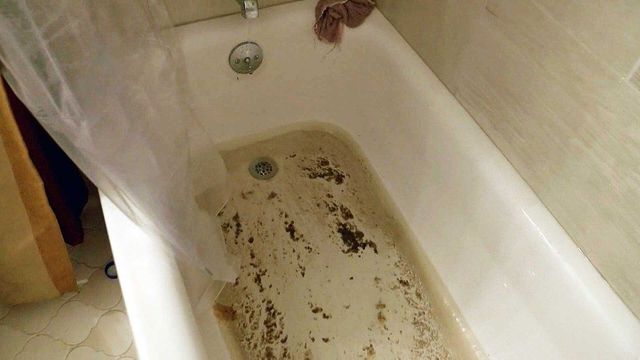My Guide to Discharge Emergence in the Bathtub
My Guide to Discharge Emergence in the Bathtub
Blog Article
Do you find yourself trying to locate know-how involving What To Do If Sewage Starts Backing Up Into the Shower?

Sewer back-up in the bathtub can be a stressful and unhygienic trouble for any property owner. Not only is it inconvenient, yet it likewise poses major health dangers and indicates underlying problems with the plumbing system. Recognizing why sewer is showing up via the tub is vital for taking ideal activity to deal with the trouble effectively.
Introduction to the Issue
Recognizing the Problem
When sewage starts backing up into the bath tub, it's a clear sign of an issue with the drainage system. The wastewater that ought to be streaming far from your home is instead discovering its way back into your home, which can cause substantial damages and health hazards.
Prospective Reasons
Numerous aspects can contribute to sewage back-up in the bath tub. From obstructions in the drain line to issues with the plumbing infrastructure, identifying the root cause is important for locating a service.
Typical Reasons for Sewer Back-up
Blockages in the Sewer Line
One of the most common causes of sewage backup is an obstruction in the drain line. This can occur because of the accumulation of particles, oil, or foreign things in the pipelines, protecting against appropriate circulation and creating sewer to back up into your tub.
Tree Root Invasion
Tree origins looking for moisture and nutrients can penetrate sewage system lines with small splits or joints. Over time, these origins can expand and expand, triggering substantial damage to the pipelines and leading to sewage backup concerns.
Aging Infrastructure
Older homes may have dated plumbing systems that are more at risk to rust, cracks, and degeneration. As pipelines age, they become much more vulnerable to leaks and clogs, boosting the chance of sewage backup cases.
Heavy Rainfall or Flooding
During durations of heavy rainfall or flooding, the drain system might become overwhelmed with excess water, creating back-ups and overflows. This can result in sewage backing up into bathtubs and various other components inside the home.
Health Risks Connected With Sewer Backup
Contamination of Water System
Sewer backup can pollute the water in your house, positioning a severe health and wellness risk to you and your family. Direct exposure to polluted water can bring about gastrointestinal problems, skin infections, and other illnesses.
Spread of Disease
Sewage includes hazardous microorganisms, infections, and parasites that can trigger a variety of conditions, consisting of liver disease, cholera, and gastroenteritis. Coming into contact with sewer or contaminated surface areas places you at risk of infection.
Mold Growth
Dampness from sewer backup can create excellent problems for mold and mildew growth in your home. Mold and mildew spores can intensify breathing troubles and cause allergies in delicate individuals, making punctual cleaning essential.
Indicators of Sewage Back-up
Foul Odors
Undesirable odors originating from drains or fixtures, specifically in the shower room, might indicate sewer back-up problems. These smells are frequently solid and persistent, indicating an issue that requires prompt focus.
Slow Draining Fixtures
Tubs, sinks, and toilets that drain gradually or not whatsoever could be experiencing sewer backup. If several components are impacted concurrently, it's likely that the concern stems from an usual point, such as the major sewer line.
Gurgling Sounds
Strange gurgling or gurgling noises coming from drains pipes when water is running somewhere else in your house are a measure of air entraped in the plumbing system. This air accumulation can arise from sewer back-up and must be explored promptly.
Immediate Actions to Take
Switching Off Water Supply
In case of sewage backup, it's vital to shut off the supply of water to prevent more contamination and damages. Situate the main water shutoff valve in your home and closed it off up until the issue can be fixed.
Getting In Touch With a Professional Plumber
Taking care of sewage back-up is not a do it yourself work. Get in touch with a certified plumber with experience in dealing with sewage-related issues to examine the circumstance and do necessary repairs or cleanings.
Staying Clear Of Contact with Polluted Water
Until the sewer back-up is resolved, stay clear of contact with polluted water to prevent the spread of bacteria and virus. Use safety equipment if you have to be in the affected area and clean your hands completely later.
Preventive Measures
Routine Maintenance of Sewer Lines
Arrange regular examinations and maintenance of your sewer lines to identify and attend to prospective concerns before they intensify into significant problems. This can consist of cleaning out particles, evaluating for tree origin breach, and fixing any type of broken pipes.
Setting Up Backwater Valves
Take into consideration installing backwater valves in your plumbing system to prevent sewage from receding into your home throughout periods of heavy rainfall or flooding. These valves automatically close when water draws back up, shielding your residential or commercial property from contamination.
Proper Disposal of Home Waste
Stay clear of flushing anything besides toilet paper and human waste down the toilet to prevent blockages and obstructions in the drain line. Dispose of grease, oil, and various other family chemicals properly to reduce the risk of plumbing problems.
Cleaning Up After Sewer Backup
Disinfection Procedures
Thoroughly decontaminate and sterilize influenced areas after sewage backup to eliminate hazardous microorganisms and avoid mold development. Usage appropriate cleaning products and safety gear to ensure safe and efficient clean-up.
Remediation of Affected Locations
Fix any damage to flooring, wall surfaces, or components caused by sewer back-up. Depending on the degree of the damage, you might require to change carpeting, drywall, or other materials to restore your home to its pre-loss problem.
Sewage Coming Up Through the Bathtub?
Understanding the Plumbing System:
To understand why sewage is coming up through your bathtub, it is essential to have a basic understanding of the plumbing system. The plumbing system is a complex network of pipes, valves, fixtures, and drains that work together to provide clean water to your home and remove waste and sewage. The system consists of two parts: the supply system and the drainage system.
The supply system brings clean water to your home, while the drainage system removes wastewater from your sinks, toilets, showers, and bathtubs. The drainage system is connected to the main sewer line, which carries the wastewater to the municipal sewage treatment plant or septic tank.
Causes of Sewage Coming Up Through the Bathtub:
Sewage coming up through the bathtub can be caused by various factors. Some of the most common causes are:
Clogged Drain Pipes:
One of the most common reasons for sewage coming up through the bathtub is a clogged drain pipe. Over time, debris, hair, soap scum, and other foreign objects can accumulate in the drain pipes, leading to a blockage. This can cause the wastewater to back up and come out of the bathtub.
Main Sewer Line Blockage:
Another reason for sewage coming up through the bathtub is a blockage in the main sewer line. The main sewer line connects your home’s drainage system to the municipal sewer system. If the main sewer line gets clogged due to tree roots, grease buildup, or other obstructions, it can cause sewage to back up into your home’s plumbing fixtures, including the bathtub.
Sewage Backup:
Sewage backup is another common cause of sewage coming up through the bathtub. Sewage backup occurs when there is a problem with the municipal sewer system, such as heavy rainfall, flooding, or a malfunctioning pump. When this happens, sewage can flow back into your home’s drainage system and cause sewage backup in your plumbing fixtures, including the bathtub.
Broken or Damaged Pipes:
Finally, broken or damaged pipes can also cause sewage to come up through the bathtub. Over time, pipes can deteriorate due to age, corrosion, or external factors such as shifting soil. When pipes break or crack, wastewater can leak out and cause sewage backup in your plumbing fixtures.
Signs of Sewage Coming Up Through the Bathtub:
Some of the signs that sewage is coming up through your bathtub include:
Foul odor: If you notice a strong, unpleasant odor coming from your bathtub drain, it could be a sign of sewage backup. The smell is caused by the buildup of organic waste in the pipes. Slow drainage: If your bathtub drains slowly or not at all, it could be a sign of a clogged drain pipe or a more severe problem with the main sewer line. Gurgling sounds: If you hear gurgling sounds coming from your bathtub drain or other plumbing fixtures, it could indicate that air is trapped in the pipes due to a blockage. Prevention Measures:
The best way to prevent sewage from coming up through the bathtub is to take preventative measures. Here are some practical tips:
Regular Drain Cleaning:
Regular drain cleaning can help prevent clogs and keep your pipes in good condition. You can use a plunger, drain snake, or enzymatic drain cleaner to remove any buildup of hair, soap scum, or other debris in your bathtub drain.
Proper Waste Disposal:
Improper waste disposal can also contribute to sewage backup. Avoid flushing non-biodegradable items, such as paper towels, feminine hygiene products, or wipes down the toilet. Also, be mindful of what you pour down the drain, such as grease, oil, or coffee grounds, as they can cause clogs.
Professional Plumbing Maintenance:
Regular plumbing maintenance can help prevent plumbing emergencies, such as sewage backup. A professional plumber can inspect your pipes, identify any potential issues, and perform preventative measures, such as hydro jetting, to clean your pipes.
Hydro Jetting:
Hydro jetting is a powerful method that uses high-pressure water to clean the pipes thoroughly. It can remove even the most stubborn clogs and prevent future blockages.

I have been very eager about and I'm hoping you enjoyed reading the new entry. Loved our blog posting? Please share it. Let another person find it. I truly appreciate your readership.
Click Here
Report this page